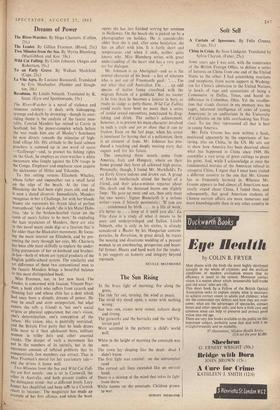Dreams of Power
The River-Watcher is a novel of violence and immense subtlety: it deals with kidnapping, revenge and death by drowning—though its over- riding theme is the analysis of the fascist men- tality. Conrad Manders has retired to Corrie in Scotland, but the power-complex which before the war made him one of Mosley's henchmen he now directs towards the minutiae of high- land village life. His attitude to the local salmon Poachers is summed up in one word of scorn --`Golliwogs'--and, to protect his fishing rights on the Gask, he employs as river-watcher a white mercenary who fought against the UN troops in the Congo. Employer and employee soon acquire the nicknames of Hitler and Tshombe.
To this setting returns. Elizabeth Whatley, Whose father and stepmother run a small hotel on the edge of the beach. At the time of Hiroshinv she had been eight years old, and she iS now a dazed divorcée. Immediately, Manders recognises in her a Challenge, for with her blonde beauty she represents his Aryan ideal of perfect womanhood; `she is depth,' she is his Mater Dolo- rosa, `she is the broken-hearted statue on the tomb of men's failure to be men.' In exploding the ham mysticism of Manders, there are also in this novel many snide digs at a fascism that is far older than the Blackshirt movement. By focus- ing the main interest on Elizabeth, and by pre- senting the story through her eyes, Mr. Charteris has been able most skilfully to explore the under- lYing pretensions of her ex-husband and brother- in-law—both of whom are typical products of the English public-school system. The similarity and Yet difference of these two conventional men to the fanatic Manders brings a beautiful balance tn this most distinguished book.
Miss Freeman, too, in her new book The Leader, is concerned with fascism. Vincent Pear- man, a bank clerk who suffers from catarrh and thinning hair and whose chin has a dent which had once been a dimple, dreams of power. He flay be small and seem unimportant, but what counts (he tells a friend) is 'not one's social origins or physical appearance, but one's vision, One's determination, one's conception of the future.' His vision, alas, is painfully restricted; and the Britain First party that he leads draws little more to it than adolescent boys, militant Women in trilby hats and other assorted cranks. The danger of such a movement lies not in the numbers of its recruits, but in the enormous amount of inflated publicity that its comparatively few members can attract. That is Miss Freeman's moral for her cautionary tale— and she drives it home well.
Two Minutes from the Sea and Wild Cat Fall- ing are first novels: one is set in Cornwall, the Other in Australia. and both present studies of the delinquent mind—but at different levels. Lucy ienner has shoplifted and been sett to a Cornish resort to 'recover:. The magistrate has made an example of her first offence, and when the book opens she has just finished serving her sentence in Holloway. On the beach she is picked up by a photographer on holiday. He is considerably older than she is and, after some hesitation, she has an affair with him. It is fairly short and tempestuous and when it ends, neither quite knows why. Miss Blumberg writes with great understanding of the heart and has a very good ear for dialogue.
Mr. Johnson is an Aboriginal—and so is the central character of his book--a boy of nineteen who is just out of Freemantle gaol: . . I'm not what they call Australian. I'm . . . an odd species of native fauna crossbred with the migrant flotsam of a goldfield.' But no sooner is he free than he becomes a loiterer in bars, as ready to cadge as petty-thieve. Wild Cat Falling could easily have been no more than a series .of sordid sexual encounters, punctuated by drug- taking and drink. The author's achievement, however, is to present his main character involved in such a cycle and yet to show that it can be broken. Even on the last page, when his arrest is imminent for having shot at a policeman, there is an element of hope. Mr. Johnson has pro- duced a touching and deeply moving story that augurs well for his future.
The remaining three novels come from America, Italy and Hungary, where on their home ground they have all achieved high praise. Personally, though, I found Mr. Markfield's To an Early Grave tedious and drawn out. A group of Jewish intellectuals attend the burial of a friend„ and their joke-a-minute repartee about life, death and the deceased leaves one slightly limp: 'He gave up meat and sex, then only meat for two weeks.' Signor Bianciardi is a serious writer—even if bitterly pessimistic: 'If you are . . . condemned by birth . . . to a life of work, it's better to . . . keep at it until you die.' La Vita Agra iS* a study of what it means to be poor and underprivileged and Italian. Ldszld Nemeth, who is only in his sixties, is already considered a ',taster by his Hungarian contem- poraries. In Revulsion, in great detail, he traces the wooing and disastrous wedding of a peasant woman to an overbearing, prosperous and boast- ful farmer. Heavy and hard work for the reader, it yet suggests an honesty and integrity beyond reproach.
NEVILLE BRAYEIROOKE






























 Previous page
Previous page